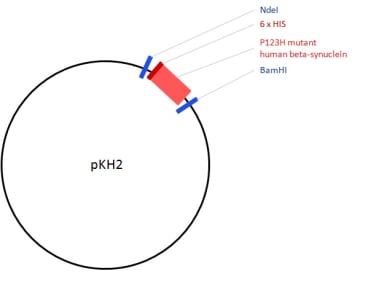pKH2 Beta-Synuclein P123H Vector
Invented by Dr Fiona Benson from Lancaster University
Invented at Lancaster University
- Datasheet
- References (0)
- Inventor Info
Info
| Catalogue Number | 152053 |
| Antigen/Gene or Protein Targets | Beta-synuclein |
| Relevance |
Beta synuclein is an abundant pre-synaptic phosphoprotein that is found in the brain and is homolgous to alpha-synuclein. Beta-synuclein is distinct from alha-synuclein in that it lacks the majority of the hydrophobic non-amyloid-beta component of the Alzeheimer's disease amyloid region. Due to this beta-synuclein is less likely to form insoluble aggregates when compared to alpha-synuclein. It is thought that beta-synuclein may have a protective role against alpha-synucleinopathies. Overexpression of beta-synuclein mutants (P123H and V70M) in neuroblastoma cells results in enhanced lysosomal pathology suggesting a causative role for these missense mutations in neurodegeneration stimulation |
| Research Area | Neurobiology |
| Notes | pKH2 ("P123H") is a derivative of pET15b with the open reading frame encoding the P123H mutant human beta-synuclein (β-synuclein) cloned in via the vector NdeI and BamHI restriction sites. It was constructed via site-specific mutagenesis of pJEK12 (pET15b-wt β-synuclein), replacing the C at position 368 in the ORF nucleotide sequence with A, thus altering the 123rd codon from CCC encoding proline (P) to CAC encoding histidine (H). In this construct P123H β-synuclein is expressed as a fusion protein with an N-terminal six His tag. |
References
There are 0 reference entries for this reagent.
References: 0 entry
There is no reference for this reagent yet, feel free to use the button below to suggest one.
Add a reference
References: 0 entry
There is no reference for this reagent yet, feel free to use the button below to suggest one.
Add a reference






